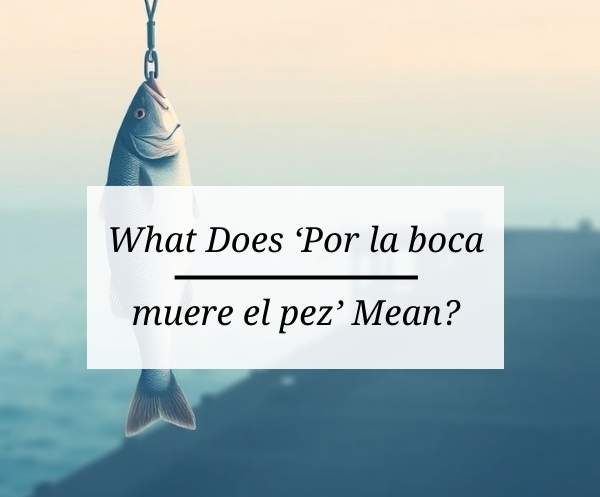“Por la boca muere el pez” literally means “the fish dies by its mouth.” In plain English, it’s a vivid way to say that speaking too freely can lead to trouble. If you’re an English speaker hearing this Spanish proverb for the first time, here’s the scoop: talking too much can bite you back.
Breaking It Down
Imagine a fish that bites on bait and gets caught. That’s exactly what happens when someone reveals too much—they get trapped by their own words. This saying is all about discretion and knowing when to zip it.
The Origins and Cultural Roots
-
From Fishing to Everyday Life:
The proverb comes from the fishing tradition. Imagine a fish that opens its mouth to bite the bait and ends up getting caught—this image is a perfect metaphor for how a careless word can lead to trouble. There’s even a fuller version from Castilian Spanish: “por la boca muere el pez y el hombre por la palabra.” This extended version not only applies the lesson to fish but also reminds us that people, too, can get into trouble by speaking too freely. -
Passed Down Through Generations:
Although it began in Spain, this saying quickly became a beloved part of the cultural fabric throughout Latin America. It has been passed down at family gatherings, shared in local cafés, and spoken about on the streets of not just my home country of Argentina but throughout the region. This enduring wisdom continues to bond communities by reminding everyone of the importance of discretion. -
A Lesson in Discretion:
Beyond its fishing metaphor, the proverb is a powerful reminder to think before you speak. In cultures where personal reputation and trust are highly valued—especially in Latin America—knowing when to hold back can be a lifesaver, both literally and figuratively.
Variations and Similar Proverbs
This proverb has inspired many variations and similar sayings, each reinforcing the idea that speaking without caution can lead to unintended consequences. Here are some of the most common variations:
-
Complete Expression:
“Por la boca muere el pez y el hombre por la palabra.”
This fuller version extends the idea to human behavior, warning that just as a fish dies by its mouth, a person can be undone by careless words. -
Animal Variation:
“Por el pico muere la perdiz.”
Here, the proverb uses a different animal—a partridge—to illustrate the same point: an indiscreet action leads to downfall. -
Bull and Man Comparison:
“Al toro por las astas y al hombre por la palabra.”
This expression draws a parallel between a bull being caught by its horns and a man being trapped by his words, highlighting inherent vulnerabilities. - Other Similar Sayings:
- “Habla poco, escucha más, y no errarás.”
(“Speak little, listen more, and you will not err.”)
Emphasizes the value of listening over talking. - “Quien mucho habla, mucho yerra.”
(“He who speaks much, errs much.”)
A reminder that verbosity often leads to mistakes. - “Si el juil no abriera la boca, nunca lo pescarían.”
(“If the juil didn’t open its mouth, it would never be caught.”)
A humorous take reinforcing that some things should remain unsaid. - “El pez muere por la boca, y también el hombre.”
(“The fish dies by the mouth, and so does the man.”)
A succinct version linking human error with excessive talk. - “El pez por su propia boca se condena.”
(“The fish is condemned by its own mouth.”)
A clear statement about self-inflicted downfall. - “En boca cerrada no entran moscas.”
(“Flies don’t enter a closed mouth.”)
Suggesting that keeping quiet helps avoid unnecessary trouble.
- “Habla poco, escucha más, y no errarás.”
- Related Proverb in English:
“One is the owner of what one keeps silent, and a slave to what one says.”
This proverb, though not a direct translation, conveys a similar message about the power and consequences of words.
Each of these variations carries the same core lesson: think before you speak. Whether it’s through the image of a fish, a partridge, or even a bull, the message is clear—your words have power, so use them wisely.
When to Use it: Real-Life Example
Imagine you’re planning a surprise party for a friend. You casually mention a detail about the event to someone who wasn’t supposed to know. Before long, the secret gets out, and the guest of honor finds out about the party ahead of time. That’s a perfect case of “por la boca muere el pez.” Your offhand comment ended up setting a trap that ruined the surprise. This goes to show that even a small slip of the tongue can have big consequences.
Final Thoughts
For anyone new to this Spanish phrase, remember: “Por la boca muere el pez” is a reminder that in life, as in fishing, every word counts. It teaches us to value discretion—a lesson deeply woven into the cultural fabric of Spain and much of Latin America. So, next time you’re about to spill too much, ask yourself: Is it really worth it?
Take Action Now:
- Pause before speaking.
- Consider the impact of your words.
- Keep some things to yourself.
Embrace this piece of Spanish wisdom, and make every word count.





